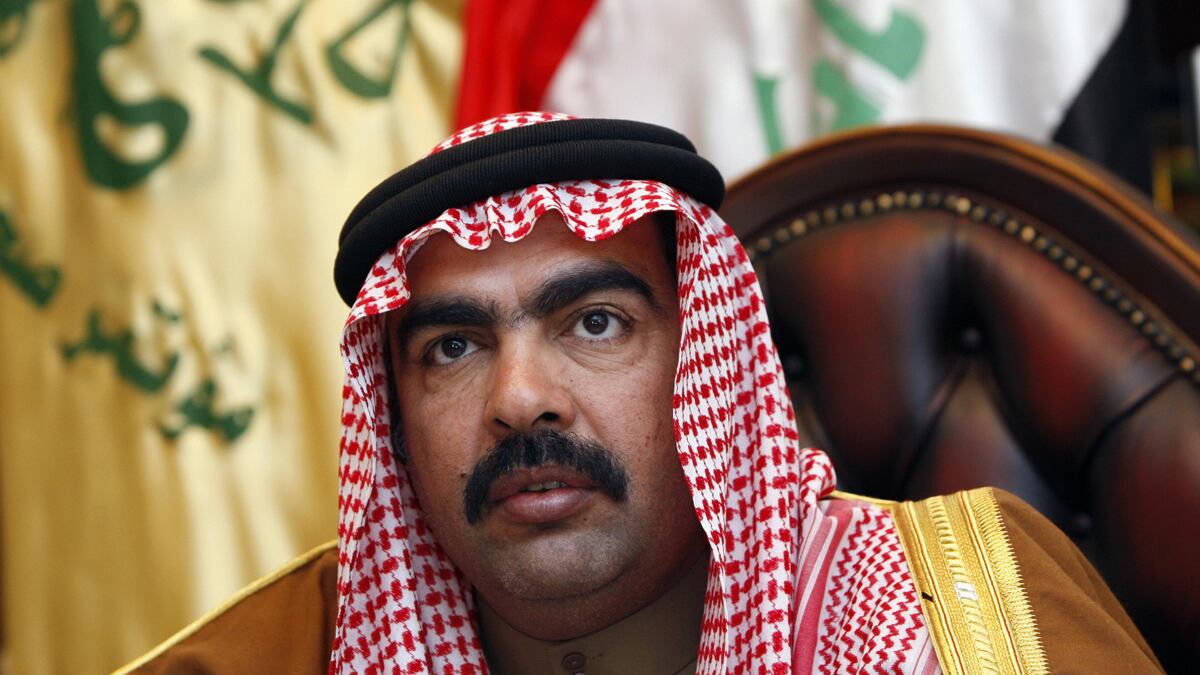A little more than four years ago in western Iraq, then-senator Barack Obama met for 90 minutes with a group of Arab sheiks, allies of the U.S. military in the war against al Qaeda. Known as the Anbar Awakening, the tribal leaders are credited by the Marine Corps’ own official historian with helping turn the tide of the Iraq War and creating the conditions on the ground for the country’s fragile government to survive. During the meeting the future president assured the group that there would be a long-term partnership between America and Iraq, according to two of the sheikhs who were there and a U.S. translator in the meeting.
Four years later, one of those sheiks, Ahmad Abu-Risha, says he feels betrayed. Abu-Risha, the president of what is now known as the Iraqi Awakening Council, told The Daily Beast in a phone interview that he has not had any meetings with U.S. officials since American forces withdrew from Iraq in December. “President Obama said he would not forget all the sacrifices that were made,” he said. “Now we look back at that meeting and we think it was political propaganda. What he said, we don’t see it happening.”
The withdrawal from Iraq, which fulfilled a key Obama campaign promise, was touted Thursday evening on what the Democratic National Committee dubbed “national security night.” But by some accounts, the situation in Iraq remains unsettled.
The central government, according to reports from the ground, still can’t provide basic services to the population. A Baghdad court issued an arrest warrant for the country’s Sunni vice president, Tariq al-Hashemi, a day after the last U.S. troops left Iraq, alleging the elected politician was aiding terrorism. Al-Hashemi has denied the charges and said he is the victim of politicized justice. Today he is living in exile in Turkey.
Yet in other areas, things appear to be improving. Incidents of terrorism have declined since the withdrawal of U.S. troops. “Generally violence has remained very low since early 2010, and that trend continued after the American forces left,” says James Jeffrey, who served as U.S. ambassador to Iraq between 2010 and 2012 and is now a visiting fellow at the Washington Institute for Near East Policy. “The attacks by Shiite militants ended. There has been some uptick in al Qaeda attacks, but they do not appear to be an order of magnitude greater than their previous levels.”
In the interview, Abu-Risha echoed that statement, saying al Qaeda did not present the same kind of threat that it did back in 2006 when he and his brothers began the uprising against the group: “The Iraqi security forces and the Awakening are working hand in hand continually to fight against al Qaeda.”

Abu-Risha also said he was not too concerned about the Iraqi government’s recent announcement that it would open Iraq’s border with Syria, a move that will allow more Syrian refugees into Iraq. “It has not influenced Anbar that much,” he said. “We are Muslims, they are Muslims. We are Arabs, they are Arabs, and we are happy to help them.”
Rather, he is most concerned that his relationship with the U.S. military has appeared to halt. He said he was assured by U.S. military leaders that he would receive regular visits from senior figures and diplomats to discuss the relationship that began in Anbar back in 2006 and 2007. “There is no contact right now,” he said. “They don’t visit at all. Ever since the United States withdrew, we haven’t gotten anyone to visit.”
Jeffrey, who left his post as ambassador at the end of May, said the meetings have not yet happened because without the U.S. military in Iraq it’s difficult for U.S. officials to travel to Anbar. “We have every intention of maintaining contact with the Awakening and other people,” Jeffrey said. “We had several meetings after the military completed its withdrawal with tribal sheiks from the greater Baghdad area, but it’s been hard to get people out to Anbar because of the security situation.” A White House spokesman declined to comment for the story.
This state of affairs stands in contrast to Abu-Risha’s relationship with the U.S. during the surge. Back then he and his brother, Abdul Sattar Abu-Risha, who was killed on Sept. 13, 2007, were in regular contact with Gen. David Petraeus. The four-star general took command of the Iraq war in 2007 and implemented the counterinsurgency known as the surge. Abu-Risha and his brother also had meetings in Anbar with President Bush, top U.S. congressmen, and senior allied military officials between 2007 and 2011.
If Abu-Risha were given a chance to speak to Obama, he says he would ask him: “Why did you leave Iraq to Iran? Why did you give up the many sacrifices that Americans made? You can still have a partnership with us. If you are going to be president for the next four years, bring Iraq back into a strategic partnership with the United States and remember the people who fought against al Qaeda with you.”






